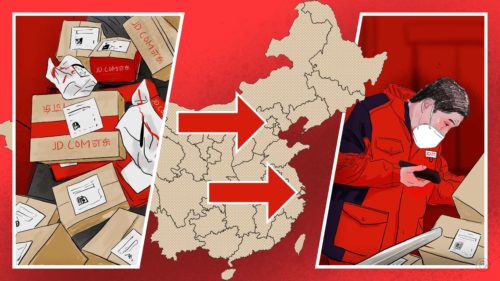China tries to boost its COVID-19 containment reputation through censorship and diplomatic pressure
As China appears increasingly confident in its containment of COVID-19 within its borders, Beijing is taking further steps to try to control the narrative of the virus outbreak. This includes both domestic censorship and international diplomacy, where pressure has been applied to tamp down criticism and boost positive portrayals of China’s handling of COVID-19.
Beijing is punishing efforts to preserve critical reporting on the early days of the outbreak. Quartz reports (porous paywall) that a “group of volunteers in China who worked to prevent digital records of the coronavirus outbreak from being scrubbed by censors are now targets of a crackdown”:
Cài Wěi 蔡伟, a Beijing-based man who participated in one such project on GitHub, the software development website, was arrested together with his girlfriend by Beijing police on April 19. The couple were accused of “picking quarrels and provoking trouble,” a commonly used charge against dissidents in China, according to Chén Kūn 陈堃, the brother of Chén Méi 陈玫, another volunteer involved with the project. Chen Mei has been missing since that same day…
Chinese citizens had been turning to Microsoft-owned GitHub after the outbreak began, as it remains one of the few major foreign websites that can still be accessed in China. Now, volunteers linked to these GitHub pages are facing the growing risk of reprisals from authorities. Another GitHub page, #2020 nCov memory, which was initiated by seven volunteers around the world to chronicle personal accounts and news stories of the outbreak, is no longer publicly available. In an email (link in Chinese), the team behind the page said that its members decided to make the page private to avoid “potential risks,” according to a screenshot of the email shared on social network Weibo.
This is a continuation of a censorship process that has been building steam for a couple of months. A month ago, a collection of Chinese journalism graduates called Young Weekly wrote about the gradual deletion of 41 important local media reports — read a The China Project translation of that account here.
Additionally, a professor in Wuhan is under investigation after “expressing support for [Fāng Fāng 方方] an award-winning novelist who documented life under lockdown in Wuhan,” the SCMP reports. “Hubei University announced on Sunday that Liáng Yànpíng 梁艳萍, a professor of its school of Chinese language and literature, was under investigation over her allegedly ‘inappropriate speech’ on social media.”
Around the world, Beijing has also continued to balk at calls for investigations or greater transparency about the origins of the virus, from countries such as Australia, Britain, France, Germany, and the United States, as we noted last week.
The European Union softened language about China in a new report about disinformation that was ready to be published last Tuesday, but was delayed in its release until Friday, the New York Times says (porous paywall). The NYT has good sourcing to show that Chinese diplomatic pressure on the EU’s representatives in Beijing is likely responsible for these revisions:
“China has continued to run a global disinformation campaign to deflect blame for the outbreak of the pandemic and improve its international image,” the initial report said. “Both overt and covert tactics have been observed.”…
The sentence about China’s “global disinformation” campaign was removed…
The original report said that European analysts had assessed a “continued and coordinated push by official Chinese sources to deflect any blame.” That wording now says: “We see continued and coordinated push by some actors, including Chinese sources, to deflect any blame.”
The new version omitted references to China’s criticism of France and a pro-Chinese bot network in Serbia.
Axios has more information on this story: EU revises China coronavirus report, courting controversy.
Beijing has undertaken other efforts to protect or boost its COVID-19 containment reputation in Germany and Australia.
“China asked Germany to put Chinese efforts to contain the coronavirus pandemic in a positive light but Berlin rejected the request, German officials have said, countering statements by Chinese diplomats,” the South China Morning Post reports.
Australia accused China of attempted “economic coercion,” after China’s ambassador to the country suggested that Chinese people could boycott Australian goods if the government continued pushing for an investigation of the origins and spread of COVID-19, Reuters reports. Read more in the Guardian: In a testy post-Covid-19 world, Chinese sanctions of Australian goods may be closer than ever.
“Often, Chinese officials tell counterparts abroad that they must publicly thank China in return for the shipments [of medical supplies], say Western officials, executives and analysts with knowledge of the exchanges,” the New York Times reported two weeks ago.
—Lucas Niewenhuis






